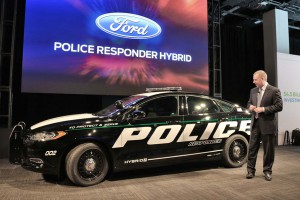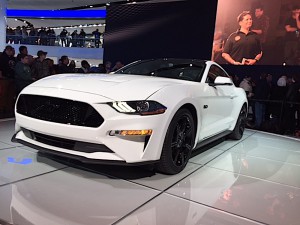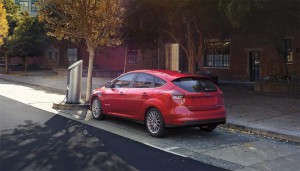President Donald Trump’s executive order reopening the “mid-term review” of federal fuel economy mandates will likely have a much smaller impact than critics have feared, according to a top Ford Motor Co. executive and other industry leaders.
Even if that review did lead to a rollback of the 54.5 mpg Corporate Average Fuel Economy, or CAFE, standards set to phase in between now and 2025, said Ford’s President of the America Joe Hinrichs, the maker’s long-term product plans are largely already in motion. If there’s any change, it will be in Ford’s sales mix.
“With the typical industry product cycle, which is five to six years, what’s we’re going to launch is already in the pipeline,” said Hinrichs, during the unveiling of a new hybrid police cruiser ahead of the annual New York International Auto Show.
(Click Here to check out the Ford Police Responder Hybrid.)
Even if U.S. mileage standards were to vanish entirely – a long-shot even for a president who has promised to slash government regulations – Ford wouldn’t tear up its product plans, Hinrichs insisted. It couldn’t, “because we don’t just develop cars for the U.S.” Europe, China and Japan are all implementing tougher mileage and emissions standards that Ford will have to meet, he said, adding that the automaker eventually expects U.S. mileage regulations will be toughened whatever Trump decides.
“Under any scenario,” said Hinirchs, “fuel economy is going to go up.”
That might mean phasing in some products more slowly in the U.S. market, but likely wouldn’t mean dropping any of the electrified vehicles now under development. During the maker’s New York preview on Monday, Hinrichs noted that Ford has committed $4.5 billion for 13 new hybrid, plug-in and pure battery-electric vehicles that will come to market over the next five years.
Some will be relatively low volume, such as the Police Responder Hybrid – which will yield a combined 38 mpg, or more than double the efficiency of a conventional police cruiser.
But there are some new models expected to generate stronger demand, as well, including hybrid versions of the big F-150 pickup and Mustang muscle car, along with an all-new, pure battery-electric SUV.
(Ford adding hybrid Mustang, other battery models. Click Here for the story.)
If anything, “the most likely result” of a rollback of CAFE “would be in the sales mix, not the number of (green) offerings,” said Hinrichs. Such a move by federal regulators would free Ford up to be more responsive to consumer demand, rather than having to take steps to force buyers into more efficient offerings by such steps as hefty incentives.
That could, in turn, mean more V-8-powered trucks like the Ford F-150, but even there, the automaker is already on a path towards higher efficiency. More than half of those full-size trucks are now sold in the U.S. with one three different V-6 engines. And Ford plans to move ahead with the launch of an F-150 hybrid, said Hinrichs.
What could have a big impact on demand for electrified vehicles would be what the Trump Administration decides to do about the $7,500 federal tax credit on qualifying battery-based vehicles, such as the Ford Focus Electric.
Given the relatively low interest in hybrids, plug-ins and BEVs – which barely accounted for 3% of the total U.S. new vehicle market in 2016, such incentive are “right now important to support the technology in order to bring up volume and bring down costs,” Hinrichs said.
Hinrichs comments might come across as a surprise considering Ford’s tough position on CAFE. His boss, CEO Mark Fields, recently warned Trump that the current mileage rules could cost a million U.S. jobs, though many analysts declared that forecast quite excessive.
Hinrichs is by no means the only senior industry executive to declare that there will be few changes, even with a CAFE rollback.
“No matter what happens in the U.S., we will not change any of our plans for electrified vehicles and more efficient vehicles,” Nissan CEO Carlos Ghosn declared during a news conference at the Geneva Motor Show last month.
That stand was echoed by Steve Center, the vice president of the Environmental Business Office at American Honda. “It doesn’t change anything. We, as an organization, have beliefs, and we are not going to tear up our plans.”
(Ford set to build EVs, plug-ins, electric powertrains in China. Click Here for the story.)



